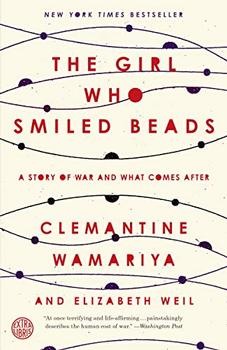Summary | Excerpt | Reviews | Beyond the Book | Readalikes | Genres & Themes | Author Bio

A Story of War and What Comes After
by Elizabeth Weil, Clemantine WamariyaExcerpt
The Girl Who Smiled Beads
The night before we taped the Oprah show, in 2006, I met my sister Claire at her apartment in a public housing unit in Edgewater, where she lived with the three kids she'd had before age twenty-two, thanks to her ex-husband, an aid worker who'd pursued her at a refugee camp. A black limo arrived and drove us to downtown Chicago, to the Omni Hotel, where my sister used to work. I now can't think about that moment without also thinking about my own naïveté, but at the time all I felt was elated.
I was eighteen, a junior at New Trier High School, living Monday through Friday with the Thomas family in Kenilworth, a fancy suburb. I belonged to the church youth group. I ran track. I'd played Fantine in the school production of Les Misérables. I was whoever anybody wanted me to be.
Claire, meanwhile, remained steadfast, herself, a seemingly rougher bargain. Unlike me, she was not a child when we got resettled in the United States, so nobody sent her to school or took her in or filled her up with resources—piano lessons, speech therapists, cheerleading camp. Claire just kept hustling. For a while she made a living throwing parties, selling drinks and hiring DJs who mixed American hip-hop, the Congolese superstar Papa Wemba, and French rap. But then she learned it was illegal to sell liquor without a license and she started working full-time as a maid, cleaning two hundred hotel rooms a week.
All I knew about the show we were taping was that it was a two-part series: the first segment showed Oprah and Elie Wiesel visiting Auschwitz, God help us; the second featured the fifty winners of Oprah's high school essay contest. Like the other winners, I had written about Wiesel's book Night, his gutting story of surviving the Holocaust, and why it was still relevant today. The book disarmed me. I found it thrilling, and it made me ashamed. Wiesel had words that I did not have to describe the experiences of my early life.
I'd dictated my essay to Mrs. Thomas, as she sat in her tasteful Midwestern house—gracious lawn, mahogany floors—at a huge old computer that took up the whole desk. "Clemantine," she'd said, "you have to enter. I just know you'll win." Mrs. Thomas had three children of her own, plus me. I called her "my American mother" and she called me "my African daughter." She packed my lunch every day and drove me to school.
In my essay I said that maybe if Rwandans had read Night, they wouldn't have decided to kill one another.
* * *
On the way to downtown Chicago, Claire and I had the inevitable conversation—is this happening? This is so weird—which was as close as my sister and I got to discussing what had happened to our lives. If we absolutely had to name our past in each other's presence, we'd call it "the war." But we tried not to do that, and that day we were both so consumed by all the remembering and willful forgetting that when we arrived at the Omni and the bellhop asked, "Do you have any bags?" we realized we'd left all our clothes at home.
Claire took the L back to her apartment, where a friend was watching her children—Mariette, who was almost ten; Freddy, who was eight; and Michele, who was five. I stayed in the hotel room, lost.
Harpo Studios gave us each a $150 stipend for dinner. It was more than Claire's monthly food stamp allowance. When Claire returned we ordered room service. We woke at 4:00 a.m. and spent hours getting dressed.
That day, for the show, the producers directed us to the huge studio. Oprah sat onstage on a white love seat, next to tired old Elie Wiesel in a white overstuffed chair. He was alive, old but alive, which meant the world to me. He kept looking at the audience, like he had a lot to say but there was no time to say it.
Excerpted from The Girl Who Smiled Beads by Clemantine Wamariya and Elizabeth Weil. All rights reserved. No part of this excerpt may be reproduced or reprinted without permission in writing from the publisher.
Your guide toexceptional books
BookBrowse seeks out and recommends the best in contemporary fiction and nonfiction—books that not only engage and entertain but also deepen our understanding of ourselves and the world around us.